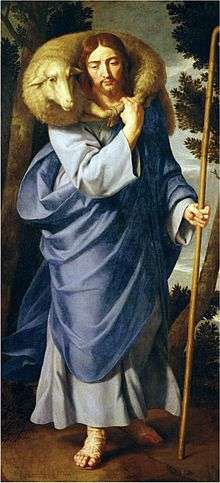Du Hirte Israel, höre, BWV 104
| Du Hirte Israel, höre | |
|---|---|
| BWV 104 | |
| Church cantata by J. S. Bach | |
 The Good Shepherd, topic of the cantata, by Jean-Baptiste de Champaigne | |
| Occasion | Second Sunday after Easter |
| Performed | 23 April 1724: Leipzig |
| Movements | 6 |
| Cantata text | anonymous |
| Bible text | Psalms 80:2 |
| Chorale | by Cornelius Becker |
| Vocal | |
| Instrumental |
|
Du Hirte Israel, höre (You Shepherd of Israel, hear),[1] BWV 104,[lower-alpha 1] is a church cantata by Johann Sebastian Bach. He composed it for the second Sunday after Easter in Leipzig and first performed it on 23 April 1724.
History and words
Bach composed the cantata in his first annual cycle in Leipzig for the second Sunday after Easter, called Misericordias Domini The prescribed readings for that Sunday were from the First Epistle of Peter, Christ as a model (1 Peter 2:21–25), and from the Gospel of John, the Good Shepherd (John 10:11–16).[2] The unknown poet begins with Psalms 80:2 and ends with Cornelius Becker's hymn "Der Herr ist mein getreuer Hirt", a paraphrase of Psalm 23 (1598). The poet refers in his work to more Bible context, such as Lamentations 3:23–25 and 1 Corinthians 10:13 for the first recitative, reflecting that God as the Good Shepherd will take care. In the second recitative, he concludes: "Only gather, o good Shepherd, us poor and erring ones; ah, let our journey soon reach an end and lead us into your sheepfold!" The last aria hopes "for faith's reward after a gentle sleep of death" (John 10:11–16, des Glaubens Lohn nach einem sanften Todesschlafe), combining the Baroque ideas of pastoral peace and longing for death.[2]
Bach first performed the cantata on 23 April 1724.[2]
Scoring and structure
The cantata in six movements is scored for tenor and bass soloists, a four-part choir, two oboes d'amore, taille (tenor oboe), two violins, viola and basso continuo.[3]
- Chorus: Du Hirte Israel, höre
- Recitative (tenor): Der höchste Hirte sorget vor mich
- Aria (tenor): Verbirgt mein Hirte sich zu lange
- Recitative (bass): Ja, dieses Wort ist meiner Seelen Speise
- Aria (bass): Beglückte Herde, Jesu Schafe
- Chorale: Der Herr ist mein getreuer Hirt
Music
Bach referred to the pastoral aspect of the text in his music. In the opening chorus, three oboes on the firm ground of extended pedal point create pastoral sounds, in triplets which are frequently associated with shepherds,[4] such as in the Sinfonia opening Part II of Bach's Christmas Oratorio. The choir sings alternating homophonic calls, "höre!" (listen!) and "erscheine!" (appear!), and two fugues on the image of Joseph leading his flocks. The fugue subject is the same in both fugues, but the second time the voices enter from the lowest voice to the highest, culminating in an ultimate third section of the calls. Different from the normal setting, the instrumental introduction is not repeated after this climax.[5]
The first recitative leads to an arioso part on the final Bible quotation "Gott ist getreu" (God is faithful).[1] The tenor aria is accompanied by two oboes d'amore. In the bass aria, instrumentation, triplets and extended pedal points are reminiscent of the opening chorus. The closing choral is a four-part setting on the tune of "Allein Gott in der Höh sei Ehr".[2]
Recordings
- Les Grandes Cantates de J.S. Bach Vol. 2, Fritz Werner, Heinrich-Schütz-Chor Heilbronn, Southwest German Radio Symphony Orchestra, Helmut Krebs, Franz Kelch, Erato 1957
- Les Grandes Cantates de J.S. Bach Vol. 2, Fritz Werner, Heinrich-Schütz-Chor Heilbronn, Pforzheim Chamber Orchestra, Kurt Huber, Jakob Stämpfli, Erato 1966
- Bach Cantatas Vol. 2 – Easter, Karl Richter, Münchener Bach-Chor, Münchener Bach-Orchester, Peter Schreier, Dietrich Fischer-Dieskau, Archiv Produktion 1973
- J.S. Bach: Das Kantatenwerk – Sacred Cantatas Vol. 6, Nikolaus Harnoncourt, Tölzer Knabenchor, Concentus Musicus Wien, Kurt Equiluz, Philippe Huttenlocher, Teldec 1980
- J.S. Bach: Complete Cantatas Vol. 6, Ton Koopman, Amsterdam Baroque Orchestra & Choir, Paul Agnew, Klaus Mertens, Antoine Marchand 2000
- Bach Edition Vol. 4 – Cantatas Vol. 9, Pieter Jan Leusink, Holland Boys Choir, Netherlands Bach Collegium, Knut Schoch, Bas Ramselaar, Brilliant Classics 2000
- Bach Cantatas Vol. 23: Arnstadt/Echternach, John Eliot Gardiner, Monteverdi Choir, English Baroque Soloists, Norbert Meyn, Stephen Varcoe, Soli Deo Gloria 2000
- J.S. Bach: Cantatas Vol. 19 (Cantatas from Leipzig 1724), Masaaki Suzuki, Bach Collegium Japan, Makoto Sakurada, Stephan MacLeod, BIS 2001
- Bachvespern Frankfurt/Wiesbaden Mitschnitte aus den Gottesdiensten Frühjahr 2005, Martin Lutz, Kantorei St. Katharinen, Bach-Collegium Frankfurt/Wiesbaden, Georg Poplutz, Markus Flaig, Bachvespern Frankfurt/Wiesbaden 2005
Notes
- ↑ "BWV" is Bach-Werke-Verzeichnis, a thematic catalogue of Bach's works.
References
- 1 2 Dellal, Pamela. "BWV 104 – Du Hirte Israel, höre". Emmanuel Music. Retrieved 29 April 2014.
- 1 2 3 4 Dürr, Alfred (1981). Die Kantaten von Johann Sebastian Bach (in German). 1 (4 ed.). Deutscher Taschenbuchverlag. pp. 256–258. ISBN 3-423-04080-7.
- ↑ "BWV 104 Du Hirte Israel, höre". University of Alberta. Retrieved 7 January 2013.
- ↑ Leonard, James (2012). "Cantata No. 42, "Du Hirte Israel, höre" BWV 104". Allmusic. Retrieved 1 May 2011.
- ↑ Mincham, Julian (2010). "Chapter 51 BWV 104 Du Hirte Israel, höre". jsbachcantatas.com. Retrieved 2 May 2011.
Sources
- Du Hirte Israel, höre, BWV 104: Scores at the International Music Score Library Project
- Du Hirte Israel, höre BWV 104; BC A 65 / Sacred cantata (3rd Sunday of Easter) Leipzig University
- Cantata BWV 104 Du Hirte Israel, höre: history, scoring, sources for text and music, translations to various languages, discography, discussion, bach-cantatas website
- Du Hirte Israel, höre: history, scoring, Bach website (German)
- BWV 104 Du Hirte Israel, höre: English translation, University of Vermont